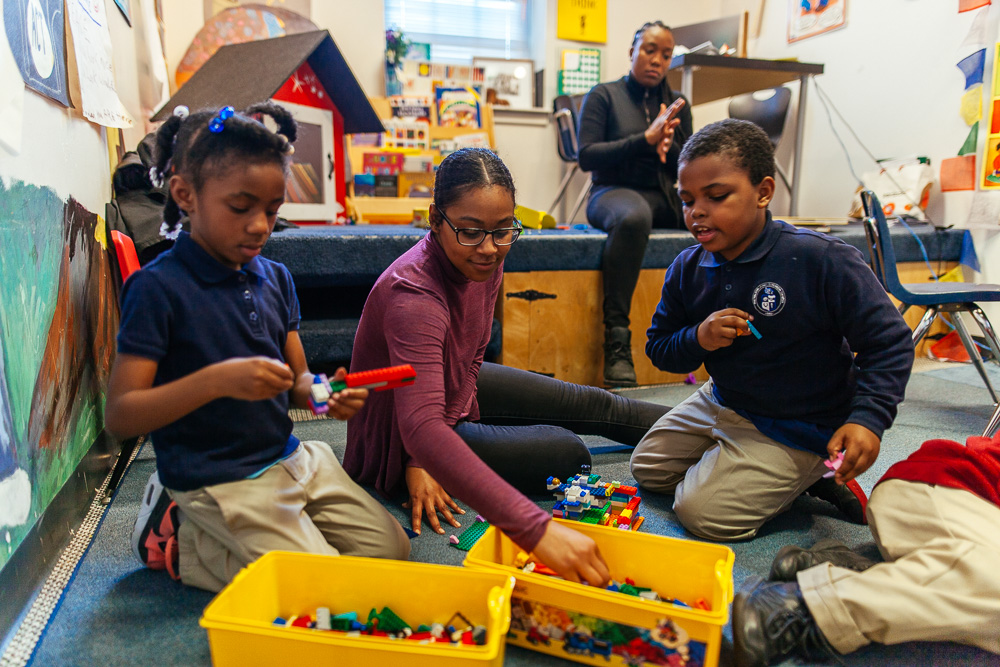As the proverb goes, “It takes a village to raise a child.” This semester, Eastern Mennonite University (EMU) sophomore Jasmine Wilson is learning that maxim’s truth. She’s helping fix firmer foundations and expand horizons for a group of children in a Washington D.C. neighborhood with nonprofit Little Friends for Peace, an organization she’ll return this summer in a paid position.
This semester, she is participating in EMU’s Washington Community Scholars’ Center, a program that combines living with other students in a house in the Brookland area of the nation’s capital and working four days a week in an internship.
“The WCSC’s relationship with Little Friends for Peace goes back at least 15 years,” says WCSC director Kimberly Schmidt. “We’ve experienced consistent, high quality placements with LFFP director MJ Park and her team of students from EMU, Georgetown and George Washington University. This internship supports WCSC’s mission to place students in community-based agencies and organizations, those who serve our most vulnerable residents in the nation’s capital.”

Program opens horizons, supports development
Wilson, a psychology major from nearby Woodbridge, Va., spends her afternoons with approximately 18 elementary students in an after-school program at the Perry School Community Service Center. Wilson picks up the children at a local school and walks them to the nearby gathering place. There she helps serve snacks, pairs volunteer tutors with children, moderates conflicts, and helps plan and carry out special projects. In February during Black History Month, she daily taught about a different historical figure.
She’s now helping the grade-schoolers plan and plant a spring garden. She assists with outings, including a recent tour of Georgetown University and peace week activities at George Washington University. These outings open horizons for children who rarely have reason to leave their neighborhood, Wilson said.
The after-school attention supports children who navigate stressful settings. They live in either a nearby housing project or a drug-rehab group home for mothers. Issues related to poverty and insecurity or the rigorous demands of the rehab program leave mothers with less energy for their children, Wilson said.
The children often lack adequate supervision, she said, and some may not get sufficient food at home. Over the years “the program has become their second family,” their village, so to speak.
Aiding in a child’s transformation
In just a few months, Wilson has witnessed change in a five-year-old who began the year without interacting or speaking with others in his kindergarten class. Although undiagnosed with a learning disability, he had fallen behind in educational goals. He angered easily, couldn’t sit still, and sometimes had to leave early due to disruptive behavior. Now he stays the full day at school.

“One highlight of my time at the after-school program has been watching him transform,” Wilson said. “He has shown tremendous improvement in academics as well as in his social and emotional skills.”
Contributing to such transformations strengthen Wilson’s career plans to work with children and mental health, perhaps as a family or child therapist after graduate studies in psychology. She’ll be following in the footsteps of her mother—a home therapist—and building on her own experiences as a nanny and a care provider in a daycare center.
Little Friends for Peace, a 35-year-old nonprofit organization dedicated to peace education, has promoted nonviolent conflict resolution for years. Wilson uses its method when disagreements surface among the after-school children. Two children may both have their hearts set on working with the same tutor on a given afternoon, for example. Wilson separates them and speaks with each individually, asking him or her to think through an approach to the impasse. A polite request, perhaps, or a suggestion that they share the tutor that day.
This Stop-Think-Act strategy also works with adults, and Wilson’s drawn to it as she adapts to life with 13 housemates in EMU’s Nelson Good House in D.C. “I’m more comfortable with conflict than some of the other students so I’ll draw everyone into a conversation about how we can approach a problem differently.”
Returning to a summer position
She’s received affirming feedback to her work with children. Little Friends for Peace has encouraged her to apply for a summer position at one of the organization’s nine Peace Camps, held in locations in D.C., Maryland and Virginia.
“Jasmine adds a lot of positive energy into our programs and I have watched her mature and grow as she engages in them,” said MJ Park, a Little Friends for Peace co-founder and director.
Community life and her internship have increased Wilson’s self-awareness. “I’m more conscious of myself and how I treat others around me,” she said. She’s learning to become more outgoing and is growing more comfortable with cross-cultural differences in this urban setting. “There are many things about myself I want to change,” Wilson said. “I am a work-in-progress.”
